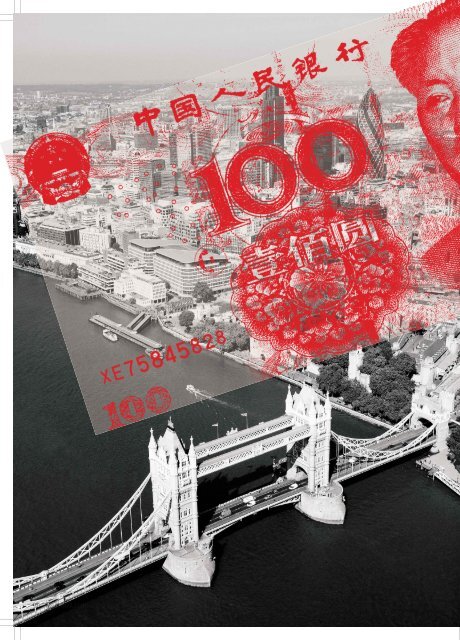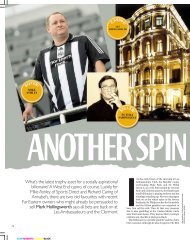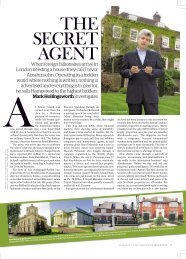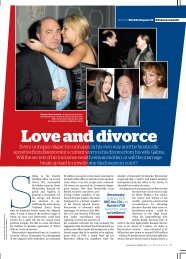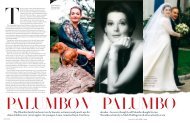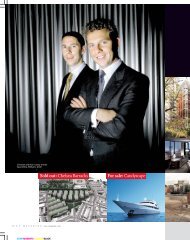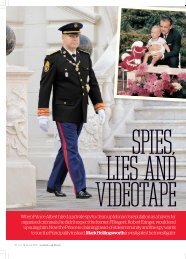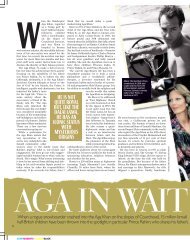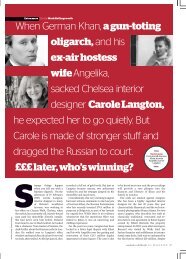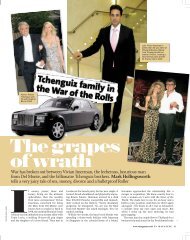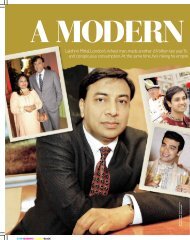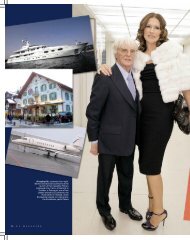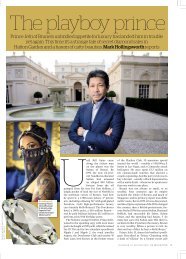20 ES MAGAZINE standard.co.uk/lifestyle - Mark Hollingsworth
20 ES MAGAZINE standard.co.uk/lifestyle - Mark Hollingsworth
20 ES MAGAZINE standard.co.uk/lifestyle - Mark Hollingsworth
You also want an ePaper? Increase the reach of your titles
YUMPU automatically turns print PDFs into web optimized ePapers that Google loves.
2 0 E S M A G A Z I N E s t a n d a r d . c o . u k / l i f e s t y l e
China town<br />
The Chinese have overtaken the Russians and Arabs as the biggest<br />
spenders on Bond Street, not to mention their taste for stuc<strong>co</strong><br />
mansions in SW1. So how long can they stay under the super-rich radar?<br />
<strong>Mark</strong> <strong>Hollingsworth</strong> investigates London’s new cultural revolution<br />
T<br />
he Chinese are fascinated and<br />
intrigued by the British. Their<br />
favourite TV character is Mr<br />
Bean, they love our Rolls-Royces,<br />
public schools, Bond Street<br />
stores, Eaton Square mansions<br />
and, above all, they appreciate<br />
our unobtrusive and light-touch<br />
system of fi nancial regulation. So<br />
it is no surprise that the latest<br />
wave of millionaire immigrants<br />
to the Royal boroughs of London<br />
hails from the East.<br />
However, this wealthy tribe is<br />
very di erent to those that have preceded it, namely<br />
the Russians and Arabs. For all their billions and their<br />
hard-nosed approach to business, the new Chinese<br />
super-rich <strong>co</strong>ming to London seek an old-fashioned,<br />
low-key Englishness. Earlier this year a Chinese buyer,<br />
entranced by a twee, discreet mews house, was prepared<br />
to pay far above the £4 million asking price on<br />
the strict <strong>co</strong>ndition that the owner left her trinkets,<br />
pictures, rugs, furniture, doilies and teaspoon <strong>co</strong>llection<br />
in situ, when she moved out. ‘His translator<br />
explained that he wanted “authentic quintessential<br />
England”, and was willing to pay over the odds to get<br />
the <strong>co</strong>mplete package’, recalls Andy Buchanan, a<br />
director of John D Wood estate agents. The owner<br />
declined to part with her spoons. ‘He was disappointed<br />
when we explained that the <strong>co</strong>ntents would not be<br />
AL AMY. GE T T Y IMAGE S ★<br />
included in the sale as they were the owner’s personal<br />
treasures. He still paid over the guide, though.’ Chinese<br />
buyers are set to replace Russian investors in the<br />
prime central London market. For China now has<br />
more billionaires (130) than any other <strong>co</strong>untry apart<br />
from the US. And an estimated 15 of them are parking<br />
at least some of their wealth in London.<br />
The reason for the Chinese infl ux (there are about<br />
80,000 Chinese people currently living in London) is<br />
primarily fi nancial. Over the past two years the value<br />
of the pound has fallen by around 30% against the<br />
yuan. Then there is the <strong>lifestyle</strong>, notably the range of<br />
British private education and private healthcare in<br />
<strong>co</strong>ntrast to the state system back home. And they<br />
crave the anonymity and freedom that moving to the<br />
West o ers. As one Chinese émigré remarks: ‘People<br />
hate you in China if you have money.’<br />
Chinese billionaires began to make their fortunes<br />
after 1978 when the Premier Deng Xiaoping, facing<br />
e<strong>co</strong>nomic stagnation and political uncertainty after<br />
the death of Chairman Mao Tse-Tung, the brutal<br />
Communist dictator, began transforming the <strong>co</strong>untry<br />
into a market e<strong>co</strong>nomy while maintaining the supremacy<br />
of the Communist Party. ‘Let some get rich fi rst, so<br />
that others can get rich later,’ he declared in a prophetic<br />
speech. During the 1980s China abolished<br />
state-owned <strong>co</strong>llectives and forced peasants to purchase<br />
farming goods. State enterprises were privatised<br />
and workers were laid o as production was streamlined.<br />
The result was a huge growth in cheap labour<br />
s t a n d a r d . c o . u k / l i f e s t y l e E S M A G A Z I N E 2 1
RE X FE ATURE S . D O MINIC O ’ NEILL . CHINA FOTO PRE S S . B I GPI C TURE SPH OTO.CO M<br />
<strong>co</strong>ncentrated in urban regions. This was<br />
exploited by a new business elite with close<br />
<strong>co</strong>nnections to the Chinese Communist Party,<br />
and by multinational <strong>co</strong>rporations that were<br />
permitted to operate within ‘special e<strong>co</strong>nomic<br />
zones’. Foreign investment grew significantly<br />
during the 1990s when China introduced tax<br />
breaks and other pro-business reforms to<br />
attract investors either.<br />
But it was not until the last decade that the<br />
Chinese super-rich emerged. In 1999, China<br />
had just one US dollar billionaire, the late<br />
Rong Yiren, a former vice-president of China<br />
who founded the state-<strong>co</strong>ntrolled Citic <strong>co</strong>nglomerate.<br />
By <strong>20</strong>03, Forbes listed three US<br />
dollar Chinese billionaires. Two years later it<br />
listed ten. Last year, the Hurun Wealth Report<br />
estimated 130, up from 101 in <strong>20</strong>08.<br />
One third of the 1,000 names on the <strong>20</strong>09<br />
★<br />
Red stars on the London skyline<br />
1 DaviD Tang<br />
Sir David Tang Wang Cheung is a<br />
Hong-Kong born businessman who<br />
owns properties in Eaton Square and<br />
Eaton Terrace. Born in 1954, he came<br />
to England when he was 13, attending<br />
the Perse School, Cambridge, and the<br />
University of London. He married<br />
Susanna Cheung S<strong>uk</strong>-yee in 1983 with<br />
whom he had a son and a daughter.<br />
They divorced in 1994. In <strong>20</strong>03 he<br />
married the British model Lucy<br />
Wastnage. His business interests range<br />
from boutique clothing chain Shanghai<br />
Tang to aviation, mining and China<br />
Tang restaurant at The Dorchester.<br />
2 Low Taek Jho<br />
Low Taek Jho, also known as Jho Low,<br />
is a billionaire known for spending<br />
thousands of dollars on Cristal-fuelled<br />
nights out with celebrities (see Paris<br />
Hilton, above) at New York and<br />
London clubs. He appeared on the<br />
scene only recently after joining the<br />
board of UBG Berhad, a financialservices<br />
group in Kuala Lumpur in<br />
<strong>20</strong>08. The source of his vast wealth is<br />
regarded by analysts as somewhat<br />
Hurun rich list are thought to be Communist<br />
Party members. This has made<br />
them extremely unpopular and <strong>co</strong>rruption<br />
is <strong>co</strong>nsistently rated as the number<br />
one <strong>co</strong>ncern for the Chinese public. It is<br />
no wonder, then, that Chinese oligarchs<br />
are keen to move their wealth abroad.<br />
Despite low taxes in their homeland,<br />
they remain nervous that their fortunes<br />
<strong>co</strong>uld be sequestrated by the authoritarian<br />
state. Many have moved cash offshore<br />
or into private banks in Singapore (where<br />
they are given permanent residence without<br />
any checks). But now the UK is increasingly<br />
regarded as a safe haven where they will not be<br />
asked awkward questions and can rely on an<br />
independent judiciary to resolve <strong>co</strong>mmercial<br />
disputes.<br />
Moving to the UK is relatively easy for<br />
★ 1 ★ 2 ★ 3 ★ 4<br />
mysterious. An enthusiastic Anglophile,<br />
Jho Low attended Harrow where he<br />
said he ‘built the <strong>co</strong>re foundation of<br />
<strong>co</strong>ntacts for the future’ including the<br />
son of the former King of Jordan. He<br />
once described his approach to life as<br />
‘right place, right time, right people’.<br />
3 Yan Huo<br />
Yan Huo, 41, is a London-based<br />
financier. He is the 714th richest<br />
person in Britain with an estimated<br />
wealth of £90 million. He moved to<br />
London in <strong>20</strong>05 and founded the<br />
hedge fund Capula Investment<br />
Management. In <strong>20</strong>08 Goldman<br />
Sachs bought just under <strong>20</strong> per cent<br />
of Capula, a deal estimated to have<br />
been worth £100 million.<br />
Yan Huo and his wife Xue Fang<br />
have a home in Wy<strong>co</strong>mbe Square, W8,<br />
and have set up a children’s charity<br />
called The Huo Family Foundation.<br />
4 anDY anD<br />
PaTTi Wong<br />
Andrew and Patricia Wong are a<br />
London-based socialite <strong>co</strong>uple best<br />
known for their Chinese New Year<br />
parties. Both are Catholics and<br />
members of powerful Hong Kong<br />
banking families. The Wongs arrived in<br />
London in 1995. Andy was educated<br />
at Cambridge while Patti attended<br />
Oxford. Then Andy joined Mercury<br />
Asset Management while Patti<br />
became chairperson of Sotheby’s Asia.<br />
The Wongs’ flamboyant annual bash<br />
is always themed. Locations have<br />
included the Royal Courts of Justice,<br />
Madame Tussauds, County Hall and<br />
the Millenium Dome.<br />
The <strong>co</strong>uple live in a Foster-designed<br />
penthouse in Battersea. The dynamic<br />
between them has been likened to<br />
Richard and Judy: ‘She wears the<br />
trousers and he drops clangers all over<br />
the place,’ <strong>co</strong>nfides one friend.<br />
5 JosePH Lau<br />
Joseph Lau Luen Hung is a property<br />
ty<strong>co</strong>on and socialite from Hong Kong<br />
with a fortune estimated at $6 billion<br />
who has invested around £70 million<br />
in London houses, notably in Eaton<br />
Square, SW1. He is chairman, CEO<br />
and the majority shareholder of<br />
Chinese Estates Group, which was to<br />
wealthy foreigners: all they need is £1 million<br />
for an investor’s visa. For the Chinese,<br />
though, this is a problem, because legally<br />
they are only allowed to take $50,000 out<br />
of the <strong>co</strong>untry. Clearly there are ways<br />
around the regulators since the Chinese<br />
regularly buy London property for several<br />
millions. Their main method is to<br />
use offshore banks and sell shares on foreign<br />
stock exchanges.<br />
The London spree has been led by<br />
Joseph Lau who has spent £70 million on<br />
three Eaton Square houses. A house on<br />
Chester Square was sold to a Chinese ty<strong>co</strong>on<br />
earlier this year for £17.1 million, and last<br />
December an imposing Tudor-style family<br />
home on Avenue Road, St. John’s Wood, was<br />
bought by another Chinese for £11.7 million.<br />
They also favour Marylebone, particularly<br />
★ 5<br />
purchase Tower 42 in the City until<br />
talks fell apart earlier this month.<br />
Lau is also a director of the Hong<br />
Kong luxury retailer Lifestyle, and<br />
Savills Management Group, part of<br />
Savills estate agents. The <strong>20</strong>10 Sunday<br />
Times Rich List ranked him as the 12th<br />
richest person in the UK.<br />
Born in Hong Kong in 1951, Lau grew<br />
up in Guangdong. His family<br />
emigrated to Canada where he was<br />
educated. In Hong Kong he lives at<br />
Moorsom Road, Jardine’s Lookout. But<br />
he is spending more time here. He<br />
owns one of the world’s finest wine<br />
<strong>co</strong>llections and is an avid art <strong>co</strong>llector.<br />
In <strong>20</strong>06 he paid a re<strong>co</strong>rd £9 million for<br />
Andy Warhol’s portrait of Mao Tsetung<br />
and last year he bought a £6m<br />
flawless blue diamond.<br />
Lau is divorced with four children<br />
and is currently dating a former Miss<br />
Hong Kong semi-finalist Yvonne Lui. In<br />
<strong>20</strong>08 it was alleged that he had<br />
fathered a child with his assistant Chan<br />
Ho Wan. His son Lau Ming-wai, a<br />
director of his holding <strong>co</strong>mpany<br />
Chinese Estates, was educated at<br />
King’s College London and the LSE.<br />
s t a n d a r d . c o . u k / l i f e s t y l e E S M A G A Z I N E 2 3
Wimpole Street and Marylebone High Street.<br />
Their hunting ground stretches from Paddington<br />
via Bayswater and across to Great<br />
Portland Street but not Notting Hill, which is<br />
regarded as ‘too edgy and bohemian’: the Chinese<br />
are thought to be <strong>co</strong>nservative,<br />
<strong>co</strong>nventional and respectful of authority, so<br />
no Dalston or Shoreditch for them.<br />
They are also discreet: earlier this year the<br />
well-<strong>co</strong>nnected property <strong>co</strong>nsultant Henry<br />
Pryor received an email from three Chinese<br />
businessmen who wanted to buy apartments<br />
in central London <strong>co</strong>sting between £3 million<br />
and £8 million. Pryor asked for the names of<br />
their lawyers and bankers and basic details<br />
about the source of their wealth – <strong>standard</strong><br />
practice in the industry. But the Chinese<br />
refused to answer any questions. ‘They were<br />
very defensive’, Pryor recalls. ‘They said that<br />
normally they would not be expected to<br />
answer these types of questions.’<br />
Pryor tried to find out more about the<br />
businessmen but they were well below the<br />
radar and did not pass the ‘know your client’<br />
test whereby agents are required to<br />
verify that their client has a sound reputation<br />
to avoid money launderers. ‘I decided<br />
not to act for them’, he says. ‘That does not<br />
mean that there was anything wrong with<br />
them. They <strong>co</strong>uld have been honest and<br />
genuinely wealthy. But they were too secretive.<br />
They were not attuned to the way<br />
business is done in the West.’<br />
London estate agents have learned to<br />
avoid showing properties that are number<br />
four on a street or have a fourth floor or four<br />
bedrooms: the number four in Cantonese<br />
sounds like the word for death. Daniel<br />
Knight, who develops properties in St.<br />
John’s Wood, created an apartment in a<br />
block in Abbey Road that listed no<br />
fourth floor. He’s also gained a basic<br />
knowledge of feng shui: ‘I stopped<br />
putting mirrors opposite the front door<br />
in my properties since that apparently<br />
reflects the energy flow right back out<br />
again,’ he says. A staircase sited directly<br />
behind the front door is similarly inauspicious<br />
– it means luck and prosperity<br />
will flow straight out of the house – and<br />
can lose agents a sale.<br />
‘The Chinese have an inherent fear of<br />
instability and chaos,’ one analyst <strong>co</strong>mments.<br />
‘They have a word for it – luan<br />
– and are <strong>co</strong>nstantly worried that something<br />
<strong>co</strong>uld go wrong. This is why they<br />
hedge their bets and move their<br />
money abroad.’ Officially, China<br />
has lent $755.4 billion to the US<br />
(by buying US Treasury securities),<br />
but the true figure is<br />
estimated to be in the trillions<br />
of dollars. And yet the Chinese<br />
e<strong>co</strong>nomy remains robust and<br />
enjoys an annual growth rate of<br />
nine per cent. ‘I think you’ll find<br />
we’re a bit more careful with<br />
our money than, say, the Russians or the<br />
Arabs,’ agrees David Tang, China’s bestknown<br />
and most-<strong>co</strong>nnected businessman in<br />
London. A UK resident since the mid-1980s,<br />
Tang is a fixture on the UK social circuit,<br />
always impeccably turned out and rarely seen<br />
without a cigar and a glass of champagne. He<br />
acts as the <strong>co</strong>mmercial interface between<br />
London and Beijing. ‘In the City you’ll<br />
find that virtually every other hedgefund<br />
manager or stockbroker is a smart<br />
young Chinese guy who is not wellknown<br />
publicly but is nonetheless<br />
extremely important and has made a<br />
great deal of money. But you don’t find<br />
many of them driving Ferraris. It is a very<br />
dangerous thing to flaunt wealth lest it be<br />
investigated [by the authorities in China]<br />
and I think the Chinese parvenu in London<br />
is <strong>co</strong>nscious of the fact that he doesn’t<br />
want to be bothered or looked into. They<br />
prefer to have money in the bank.’<br />
No fleets of pink Lamborghinis, and<br />
they rarely indulge in private jets, yachts<br />
★ From Beijing to Belgravia: the Chinese ty<strong>co</strong>ons’ favourite addresses, Eaton Sq, left, and Chester Sq, right<br />
2 4 E S M A G A Z I N E s t a n d a r d . c o . u k / l i f e s t y l e<br />
★ China in their hands, from left: Mao Zedong by Andy Warhol; ‘red capitalist’ Rong Yiren ; chairman Deng Xiaoping<br />
‘You’ll find<br />
we’re a bit<br />
more careful<br />
with our money<br />
than the<br />
Russians or<br />
the Arabs’<br />
David Tang<br />
and retinues of call-girls.<br />
Instead, they dress in T-shirts<br />
and trainers and eat in low-key<br />
restaurants. They do, however,<br />
spend their money on the largest<br />
and flashiest of watches,<br />
notably Patek Philippe, and the<br />
most expensive gadgets, especially<br />
in their homes, which are<br />
routinely kitted out with every<br />
sort of remote <strong>co</strong>ntrolled<br />
domestic appliance, and classic Rolls-Royces<br />
and Bentleys since these are classy status<br />
symbols rather than extravagant acquisitions.<br />
‘Classic’ British jewellery is especially<br />
popular but so are luxury brands such as<br />
Louis Vuitton, Gucci, Burberry and Boodles.<br />
At Dunhill, the Tradition leatherware has<br />
proved a bestseller among Chinese <strong>co</strong>nsumers,<br />
while Mulberry says that Chinese<br />
customers are its fastest-growing group.<br />
Nick Roberts, retail director, says: ‘Store<br />
feedback is that they stick to the <strong>co</strong>re styles,<br />
such as the Bayswater bag, as it is what they<br />
believe to be the i<strong>co</strong>nic Mulberry bag.’ The<br />
Chinese effect is being felt all over Mayfair,<br />
Knightsbridge and Piccadilly. Luxury stores<br />
now employ staff who speak Mandarin to<br />
cash in on the new arrivals, and the Chinese<br />
have overtaken the Russians and Arabs as<br />
Bond Street’s highest spenders.<br />
Another Chinese obsession is gambling,<br />
mainly on roulette, and the casinos at Les<br />
Ambassadeurs, The Ritz and The Sheraton<br />
are benefitting hugely. ‘The gambling is<br />
unbelievable,’ says one observer. ‘They are<br />
fanatical and reckless gamblers – both in<br />
betting on sports and at the casinos.’<br />
Nevertheless, the Chinese like stability and<br />
certainty, so they will <strong>co</strong>ntinue to park their<br />
money in British banks and spend in London<br />
shops. But they often return to their homeland<br />
after investing abroad. They understand that<br />
the power of the Chinese state will always<br />
supersede their fortunes and so delicately and<br />
carefully balance their London and Beijing<br />
<strong>lifestyle</strong>s. As one analyst remarks wryly of an<br />
especially flamboyant London-based Chinese<br />
ty<strong>co</strong>on: ‘He is as British as you want him to be<br />
and as Chinese as he needs to be.’<br />
gr aham h u s se y. a s s o ciated pre s s . ph otoshot. c amer a pre s s


